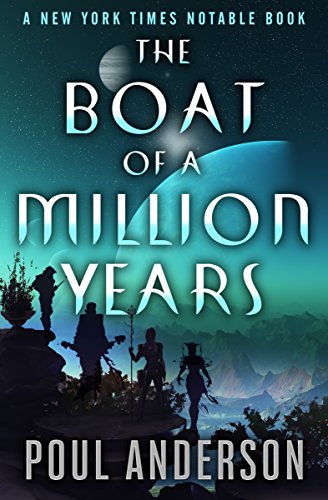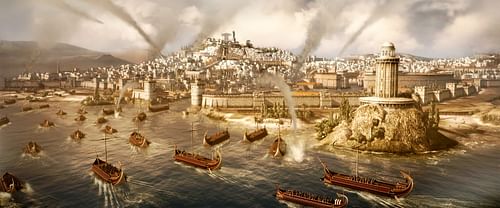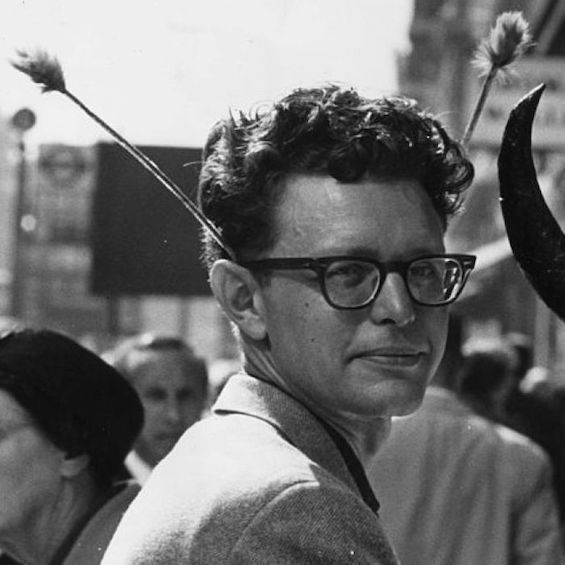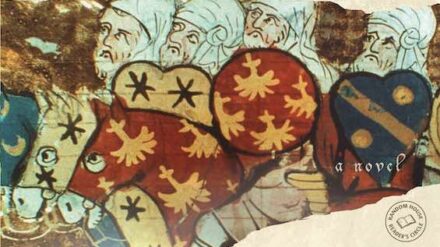
Hanno sailed the Mediterranean in the days before Carthage battled the Roman Republic in the Punic Wars (264-146 BCE). Inspired by the writings of the Greeks, he sets out on a voyage of discovery to fabled far-north Thule at the edge of the world. Yet this is but the first of Hanno’s grand adventures through the centuries. For, as it turns out, the Phoenician sailor is immortal. “Hiram was king in Tyre [969–936 BCE] when I was born there,” he later explains. Still, he looks no older than twenty-five, and never will. Thus begins Poul Anderson’s brilliant mashup of ancient history and science fiction, The Boat of a Million Years.
We meet Hanno again through the ages under different names, in the company of a redheaded man called Rufus whom he meets in the Roman imperial port of Burdigala (Bordeaux). Together, they skip through the centuries, turning up in ancient Kyiv, Constantinople at the peak of the Byzantine Empire, and Paris during the reign of Louis XIII, and a score of other towns and cities until, many thousands of years later, we meet Hanno again on the fringes of the galaxy in the company of aliens.
Estimated reading time: 7 minutes
A handful of immortals through the ages
But Hanno and Rufus are not alone in their immortality. We follow a handful of these extraordinary human beings from time to time as they crop up here and there. Tu Shan, in ancient China “ten years since glorious Wang Meng received the Mandate of Heaven” (19 CE). Okura in Heian-kyo (Kyoto), the medieval capital of Nippon (Japan). Aliyat in the ancient Syrian city of Palmyra, later a courtesan in Constantinople. Starkadh in the Norwegian port of Nidharos (today’s Trondheim). And others, but never so many as a dozen. And over time, over the long, long stretches of time, Hanno meets them all in his quest to gather about him a team of immortals.
The Boat of a Million Years by Poul Anderson (1989) 480 pages ★★★★★

Who are these immortals?
As Tu Shan explains to a mortal man who has sought him out as a sage, “I have no inspiration, no secrets to impart. I am the most ordinary of persons, except that somehow, for some reason, my body has stayed young.” Later, in another time and place, Hanno cautions an immortal named Aliyat whom he meets in Constantinople. “I have learned much in two thousand years, but nothing about any gods, except that they, too, arise, change, age, and die. Whatever there is beyond the universe, if anything, I doubt it concerns itself with us.”
Neither Tu Shan nor Hanno nor Aliyat nor any of the others are superheroes. As Hanno cautions another of them, “We’re not gods, you know. We can be slain, drowned, burned, starved like any other men. I’ve stayed on Earth these uncounted years by ganging warily.” Indeed, we learn as we follow the immortals’ course through the ages, one or another does, indeed, die.
Immortality lies heavy on their souls, as they bury husbands and wives, sons and daughters, and generations of grandchildren, themselves never growing old. As a woman then known as Okura in medieval Japan explains to a confidante, “The tricks, the deceptions, the children I have borne and, one way or another, managed to have adopted elsewhere, lest it become too plain that they grow old while I do not. That has hurt most. I wonder how much more I can endure.”
When ancient history and science fiction come together
Some three thousand years after Hanno’s birth in ancient Phoenicia, we observe the intersecting paths of the immortals in our own time. But their story doesn’t end here and now. Time surges on, carrying them forward as the surviving immortals slowly come together into a band of eight. Hanno leads them, not only as the eldest among them but for his proven foresight. For centuries, he has been building the fortune that enables them to finance their travels—and their repeated escapes from detection by government officials. Soon enough, they are venturing out into the farther reaches of the solar system and, eventually, beyond. They live to a time when immortality is no longer unique to them but near-universal within the human race. And they are among those who experience First Contact with other intelligent races scattered among the stars.
In the end, the immortals find they are alone among themselves. “We have no more home, anywhere on Earth. We’ve tried in our different ways to fit in, and people have tried to help us, but we finally face the fact that we can’t and never shall. We’re dinosaurs, left over in the age of mammals.” And so it is that at last they find a home, “four and a third light-centuries from Earth.”
A beautiful command of the English language
Poul Anderson was one of the most accomplished literary stylists science fiction has ever produced. Even today, two decades after his passing, his writing stands out for its power and beauty. Here, for example, are a couple of representative sentences: “On the east the view opened, a wrinklescape manifoldly green and tawny with forest, to right and left a sight of snowpeaks afloat in heaven. Through it wound a road, scarcely more than a track, the village its terminal.” The whole book is like that, making it a great pleasure to read.
A note about the author’s politics
Given my progressive political orientation, I’m alert to signs of inaccurate portrayals of people in politics by writers with an axe to grind. And alarm bells went off loudly about two-thirds of the way through this novel. Like Robert A. Heinlein and a few other prominent science fiction authors I might name (but won’t), Poul Anderson had a reputation as a bit of a Right-Wing nut. Or at least that’s what I heard when I was an active member of what was then the Science Fiction Writers of America in the 1970s. And it’s what seems to be the case, judging from this book.
Anderson called himself a libertarian, I believe. Apparently, if so, he was a decidedly conservative one. And it may have been extreme beliefs that led him astray in portraying a liberal United States Senator—one resembling Edward Kennedy—as pro-Communist. Which is, of course, absurd. Kennedy and his slain older brothers were rabidly anti-Communist. The whole family was close to the Right-Wing fabulist, Senator Joseph McCarthy, in his heyday. In fact, there never was, and never would be, a pro-Communist United States Senator.
About the author

Poul Anderson (1926-2001) parlayed a bent for science, a deep knowledge of history, and a degree in physics into a storied career in science fiction. He was active in the field from the 1940s to the beginning of the 21st century. He won seven Hugo Awards and three Nebula Awards, among other top honors in the genre. Anderson grew up bilingual in Danish and English. He was raised in Minnesota and graduated from the University of Minnesota in 1948. He was married for more than a half-century, living with his wife Karen Kruse in the San Francisco Bay Area. Their daughter married science fiction author Greg Bear. Anderson was a founding member of the Society for Creative Anachronism and participated in reenacting medieval jousts with other aficionados. (I attended one but didn’t enjoy it.)
For related reading
I’ve also reviewed Poul Anderson’s Tau Zero (In this great example of classic hard science fiction, humankind reaches the stars) and The Avatar (Alien life abounds in our starfaring future). And I’ve reviewed but enjoyed much less The Corridors of Time (A legendary sci-fi author makes a mess of time travel).
For more good reading, check out:
- These novels won both Hugo and Nebula Awards
- The ultimate guide to the all-time best science fiction novels
- 10 top science fiction novels
- 10 best alternate history novels reviewed here
- Eight new science fiction authors worth reading now
And you can always find my most popular reviews, and the most recent ones, on the Home Page.

























